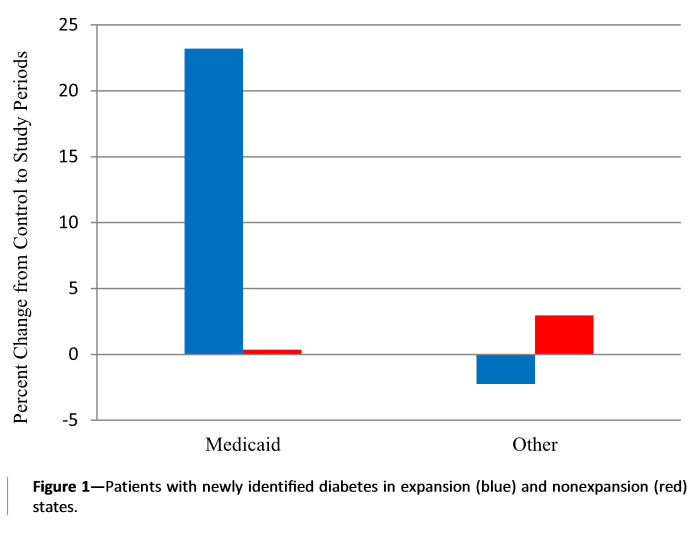The number of newly-diagnosed cases of diabetes has surged by 23 percent in states that accepted the expansion of Medicaid eligibility that was made available under the Affordable Care Act, compared to an increase of less than one percent in some states that declined the expansion.
One of the most widespread chronic diseases in the U.S., diabetes care consumes approximately 10 percent of U.S. healthcare spending, according to a study by the University of Michigan, with total spending hitting $245 billion in 2012. Experts say that early detection of the disease leads to better outcomes for patients and lower costs for care.
Related: Businesses Aren’t Seeing the Obamacare Hit Some Expected
Because of a Supreme Court ruling in a case challenging the constitutionality of Obamacare, as the ACA is known, penalties for states that opted not to expand Medicaid eligibility under the law were eliminated. This essentially made expansion optional and created what social scientists refer to as a “natural experiment.” Because 26 states (and the District of Columbia) chose to expand Medicaid while 24 states chose not to, it provided a perfect opportunity to measure the effect of the law.
The study was conducted by Quest Diagnostics, a medical testing services with clinics across the country, with assistance from Tulane Medical School. The results will be published in an upcoming edition of Diabetes Care, the journal of the American Diabetes Association, with Dr. Harvey W. Kaufman, a senior medical director at Quest as the lead author.
Looking at diabetes testing results for the first six months of 2013, before the ACA was implemented, and the first six months of 2014, after it had taken effect, the study found that positive diagnoses were up by 13 percent nationwide year-over-year. However, the vast bulk of the increase was in states that had opted to expand Medicaid eligibility – a 23 percent increase compared to only 0.4 percent for states that did not expand Medicaid.
In a sense, the data shouldn’t be terribly surprising. If more people have access to healthcare services, it stands to reason that more of them will avail themselves of it and learn that they have certain conditions. However, in an editorial accompanying the study, the editor-in-chief of Diabetes Care pointed out that early detection of the disease is not just good for patients, but also reduces the cost of treating patients who develop complications because they have not been properly diagnosed.
Related: 3 Big Health Care Changes in the House GOP’s Budget
“Kaufman et al. have…demonstrated that Medicaid expansion increases the number of low-income Americans with newly identified diabetes and will likely improve their outcomes,” wrote Editor William T. Cefalu, with William H. Herman. “The data demonstrate the benefits of Medicaid expansion, yet nearly half of our states have chosen not to expand this benefit to their citizens. The real-world benefits and costs of Medicaid expansion merit additional research and civil debate. And perhaps most important, their results should be used to guide health policy to address the growing burden of chronic diseases.”
Top Reads from The Fiscal Times





